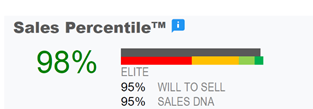How important is it that your new hire be able to identify a prospect's compelling reason to make a change or the resources they have set aside to fix their business problem? Our guess is probably pretty important.
In the 4th article of our series Hiring No Assembly Required Salespeople, we discuss the questions you must ask yourself of a candidate's skills and what critical selling competencies you must look for before making a hiring decision.

Occasionally some assembly is required when you hire a new salesperson. I have been using the Objective Management Pre-Hire Assessment with 92% predictive validity for over 20 years. OMG has assessed over 2 million people for over 31,000 companies worldwide. (Go to STAT FINDER for a high-level summary) They know what makes up an effective salesperson. And by extension, with the dozens of companies we have evaluated and the thousands of salespeople we have assessed and observed, this is what we know at Hire Better Salesperson.
Elite salespeople (the top 7% of the over 2,000,000 assessed) are evaluated just by how they score on the evaluation but are identified by their company as successful, hitting and or exceeding goals, and when stack ranked are top performers. not
What the assessment finds is the following:
- They score 613% higher in the comfortable talking about money competency than weak salespeople.
 They score 23% higher in the selling value competency
They score 23% higher in the selling value competency- They score 74% higher in the uncovering budget competency
- They score 55% higher in reaching decision making competency.
These findings beg the question or several questions, but I will start with this one:
How important is it that your new salesperson be able to...
- Ask and talk about the capacity a prospect has to invest time, money, and resources to buy the products and solutions you provide?
- Uncover and position value instead of selling, attempting to compete, or winning just on price?
- Uncover the available budget and meet with the person, or persons, that have the authority to write the check?
- Get to the actual decision-makers, or make sure that all resistance to making a decision has been eliminated, using a strategic approach working collaboratively with the inside champion?
The second question is; when would you want to know that your new salesperson is NOT capable of doing the things mentioned above? Or, somewhere in the first 12 months of their employment with you, when do you discover that they are not closing because they do not possess these competencies?

The purpose of this article is NOT to discourage you from hiring someone with these weaknesses. It's to help you better understand that by using a sales-specific assessment, instead of a personality or behavioral-based evaluation, you know in advance what assembly is required.
When you know this information, you can create a series of intelligent hiring decisions based on the answers to these questions:
- Is this candidate coachable and have the Will to Sell competencies necessary to fix or improve these areas?
- Does this candidate have the supportive Sales DNA to improve in these areas?
- Does my current sales manager know how to address these deficits? (look at your current production report. If about 36% of your people are at the bottom of your production report, that is a sign. Not hitting a goal, or 2, is another. In these cases, chances are you do not have a manager that can address, fix, or improve someone that needs assembly).
- If I have someone that can develop people, do we have the appropriate finances, time, and bandwidth?




